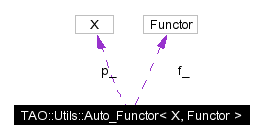
#include <Auto_Functor.h>
Collaboration diagram for TAO::Utils::Auto_Functor< X, Functor >:

Public Types | |
| typedef X | element_type |
| typedef Functor | functor_type |
Public Methods | |
| Auto_Functor (X *p=0, Functor functor=Functor()) throw () | |
| Constructor. | |
| Auto_Functor (Auto_Functor &rhs) throw () | |
| Auto_Functor< X, Functor > & | operator= (Auto_Functor &rhs) throw () |
| template<typename Y> | Auto_Functor (Auto_Functor< Y, Functor > &rhs) throw () |
| template<typename Y> Auto_Functor< X, Functor > & | operator= (Auto_Functor< Y, Functor > &rhs) throw () |
| ~Auto_Functor () throw () | |
| X & | operator * () const throw () |
| X * | operator-> () const throw () |
| X * | get () throw () |
| X * | release () throw () |
| void | reset (X *p=0) throw () |
| void | reset (X *p, Functor f) throw () |
| Functor const & | functor () const throw () |
| Auto_Functor (Auto_Functor_Ref< X, Functor > rhs) throw () | |
| Auto_Functor< X, Functor > & | operator= (Auto_Functor_Ref< X, Functor > rhs) throw () |
| template<typename Y> | operator Auto_Functor_Ref () throw () |
| template<typename Y> | operator Auto_Functor () throw () |
Private Attributes | |
| X * | p_ |
| Functor | f_ |
The functor is called in the destructor, and it must implement:
Functor() throw();
Functor(Functor const &) throw();
Functor & operator=(Functor const &) throw();
void operator()(X *p) throw();
|
|||||
|
|
|
|||||
|
|
|
||||||||||||||||
|
Constructor.
|
|
||||||||||
|
|
|
||||||||||||||
|
|
|
|||||||||
|
|
|
||||||||||
|
|
|
|||||||||
|
|
|
|||||||||
|
|
|
|||||||||
|
|
|
|||||||||||||
|
|
|
|||||||||||||
|
|
|
|||||||||
|
|
|
||||||||||
|
|
|
||||||||||||||
|
|
|
||||||||||
|
|
|
|||||||||
|
|
|
||||||||||||||||
|
|
|
||||||||||
|
|
|
|||||
|
|
|
|||||
|
|
 1.2.18
1.2.18